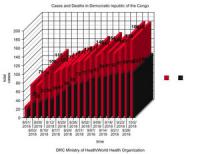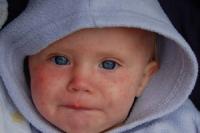-
The Presidential Candidates Are Ignoring One of the World’s Biggest Looming Threats
Whoever sits in the Oval Office come January 2021, he or she will almost inevitably have to address pandemic disease as a foreign-policy issue. The well-being of Americans in today’s globalized world is inextricably linked to that of people around the globe, while the effects of pandemics are born disproportionately by the least powerful. The next U.S. president needs a proactive strategic initiative, based in global solidarity, to address today’s pandemics, tomorrow’s outbreaks, and the health impacts of climate change.
-
-
Close-Knit, Vaccine-Reluctant Communities Stoked Measles: CDC
From 1 January to 1 October of this year, the United States tracked 22 measles outbreaks and 1,249 cases, according to a new overview published today by the Centers for Disease Control and Prevention (CDC) in Morbidity and Mortality Weekly Report (MMWR). “Eight outbreaks —defined as three or more related cases — that occurred in underimmunized, close-knit communities accounted for 85 percent of all cases,” the CDC said. And 75 percent of all cases in 2019 were part of outbreaks among Orthodox Jewish populations in New York State and City.
-
-
Ebola One Year on: The Wins, the Setbacks, and the Way Forward
The last five years have witnessed the two biggest outbreaks of Ebola, first in West Africa and currently in the Democratic Republic of Congo (DRC). The DRC is no stranger to Ebola and has battled the virus on nine previous occasions since 1976. The current outbreak, for a multitude of socio-political reasons, refuses to give in to efforts by an international team of health care workers, armed with vaccines and treatment regimes, which did not even exist during previous episodes. As the outbreak surpasses its one year mark, the virus has infected over 3000 people and claimed more than 2000 lives.
-
-
The World Knows an Apocalyptic Pandemic Is Coming
A new independent report compiled at the request of the United Nations secretary-general warns that there is a “very real threat” of a pandemic sweeping the planet, killing up to 80 million people. A deadly pathogen, spread airborne around the world, the report says, could wipe out almost 5 percent of the global economy. And we’re not ready. Laura Garrett writes that twenty-five years ago, in 1994, she published her book on the subject, The Coming Plague: Newly Emerging Diseases in a World Out of Balance, arguing that human disruption of the global environment, coupled with behaviors that readily spread microbes between people and from animals to humans, guaranteed a global surge in epidemics, even an enormous pandemic. She writes that epidemic outbreaks were aided and abetted by inept health systems, human behavior, and the complete lack of consistent political and financial support for disease-fighting preparedness everywhere in the world. Will the UN report’s warning be heeded now?
-
-
World Unprepared for Pandemic: WHO
The next deadly pandemic could spread within thirty-six hours, disrupt economies and destabilize national security, WHO and World Bank experts have said. The experts said current efforts to manage a pandemic are “grossly insufficient.” Epidemic-prone viral diseases such as Ebola, SARS, and the flu have become increasingly difficult to control, as long-term armed conflicts, forced migration, and weak and failed states become more commonplace in the world, the report warned.
-
-
Over 3,000 Killed by Deadly Virus in Democratic Republic of the Congo This Year – and It’s Not Ebola
Ebola outbreaks, such as the current one in the Democratic Republic of the Congo (DRC), which has claimed 2,074 people’s lives, are widely covered in the media. But another virus is ravaging the DRC with minimal publicity. That virus is measles.
-
-
WHO Declares Ebola Outbreak in Congo an Emergency of “International Concern”
The UN’s World Health Organization (WHO) on Wednesday declared the Ebola outbreak in the Democratic Republic of Congo a “public health emergency of international concern.” “It is a measure that recognizes the possible increased national and regional risks and the need for intensified and coordinated action to manage them,” said the WHO in a statement.
-
-
We must prepare for the next pandemic
When the next pandemic strikes, it will likely be accompanied by a deluge of rumors, misinformation and flat-out lies that will appear on the internet. Bruce Schneier writes that “Pandemics are inevitable. Bioterror is already possible, and will only get easier as the requisite technologies become cheaper and more common. We’re experiencing the largest measles outbreak in twenty-five years thanks to the anti-vaccination movement, which has hijacked social media to amplify its messages; we seem unable to beat back the disinformation and pseudoscience surrounding the vaccine. Those same forces will dramatically increase death and social upheaval in the event of a pandemic.”
-
-
Ebola outbreak spreads to Uganda – it should never have happened
The DRC is where the Ebola virus was first discovered in 1976. And the country is no stranger to this menace – this is the ninth time it has had to contain the disease. Still, this outbreak is the second largest on record – and the second to have crossed into another country.
-
-
Possible European origin of the Spanish Influenza

What happens when a military historian and a virologist get together to discuss the 1918 pandemic? What you get is a fascinating insight into a possible European origin and all sorts of things we may have overlooked.
-
-
Statistical model helps predict future disease outbreaks

Researchers have created a statistical method that may allow public health and infectious disease forecasters to better predict disease reemergence, especially for preventable childhood infections such as measles and pertussis.
-
-
DRC Ebola cases exceed 1,800 amid burial team attacks
Blowing past the 1,800 case mark, the Democratic Republic of the Congo (DRC) reported 39 cases over the weekend as well as a pair of assaults on burial teams, along with 10 new infections today, according to the latest official reports, raising the outbreak’s total to 1,826.
-
-
Congo Ebola outbreak reaches 1,600 cases, as armed clashes impede health work

The Ebola outbreak total in Congo reached the 1,600 mark, as clashes between military forces and armed militia groups flared in the city of Butembo, at the heart of the Ebola-affected region.
-
-
Inoculating against misinformation
In the lawless eastern provinces of sub-Saharan Africa’s biggest country, an Ebola outbreak that has quietly become history’s second-largest epidemic may wind up turning not on drugs or quarantine, but on a third, often underappreciated factor: trust.
-
-
Measles spreading in U.S., mostly among unvaccinated children

Measles is spreading in the U.S. As of 5 February, there were 50 cases in Washington state and five in Houston. New cases are being added daily. Health officials, including the U.S. surgeon general, are urging parents to get their children vaccinated.
-
- All
- Regional
- Water
- Biometrics
- Borders/Immig
- Business
- Cybersecurity
- Detection
- Disasters
- Government
- Infrastructure
- International
- Public health
- Public Safety
- Communication interoperabillity
- Emergency services
- Emergency medical services
- Fire
- First response
- IEDs
- Law Enforcement
- Law Enforcement Technology
- Military technology
- Nonlethal weapons
- Nuclear weapons
- Personal protection equipment
- Police
- Notification /alert systems
- Situational awareness
- Weapons systems
- Sci-Tech
- Sector Reports
- Surveillance
- Transportation
Advertising & Marketing: advertise@newswirepubs.com
Editorial: editor@newswirepubs.com
General: info@newswirepubs.com
2010-2011 © News Wire Publications, LLC News Wire Publications, LLC
220 Old Country Road | Suite 200 | Mineola | New York | 11501
Permissions and Policies
Editorial: editor@newswirepubs.com
General: info@newswirepubs.com
2010-2011 © News Wire Publications, LLC News Wire Publications, LLC
220 Old Country Road | Suite 200 | Mineola | New York | 11501
Permissions and Policies
